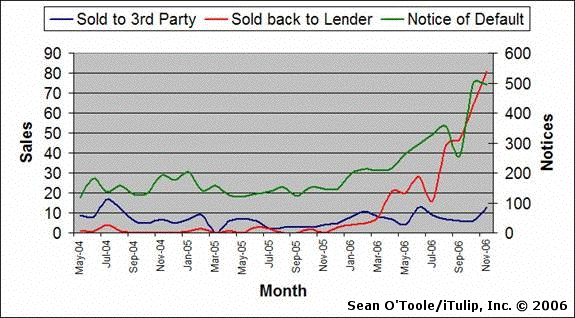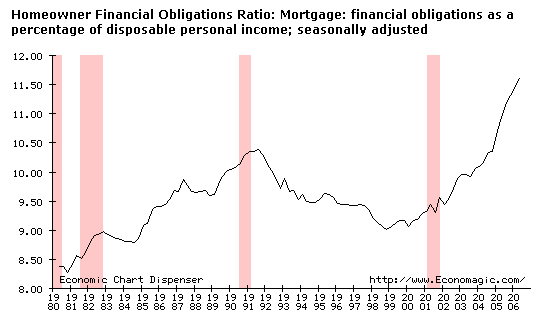US housing market is different this time - it's worse
December 8, 2006 (MoneyWeek)
“It’s different this time,” are four of the most alarming words an investor can hear. Very rarely do things turn out differently; history shows that normally they go wrong in almost exactly the same way they did last time round the cycle.
But when it comes to the US housing market, there are reasons to expect that things will be different this time. But not in the way that optimists expect – instead the difference is that the damage could be more far-reaching than ever before.
AntiSpin: Our resident real estate expert Sean O'Toole in CA weighs in today with a chart that indicates what is happening in northern CA. There are leading indicators that do not exist that Sean is creating that will help investors gauge where the market is going.
First, some more of the MoneyWeek story:

While a doubling in the number of notices of default over the past year shows a rapidly deteriorating market, even more striking is the 500% increase in number of homes sold back to lenders since May 2005. If memory serves, this usually doesn't start to happen until the later stages of a housing bust, when unemployment is rising. The reason is simple and goes back to our January 2004 prediction. Housing markets are regional; if the local job market is bad and stays that way long enough, borrowers not only can't make their mortgage payments but don't see any prospect for paying them in the near future–no jobs, no income. If they have little equity in "their" home, especially if they took out a zero-money-down loan and have only been in it for a couple of years, they are going to walk away, i.e., "sell the home back to the lender." If this many "home owners" are disowning their homes so early in the cycle, with unemployment reported at near five year lows, safe to say when unemployment begins to rise during next year's recession, the number of "home owners" turning their keys in to the bank will rise markedly.
One reason for the rise in sell-backs so early in the cycle: too much mortgage relative to disposable income. Given that the employment data are not longer reliable–with persons who work one day a week or have given up looking after year no longer counted as "unemployed" whereas these unemployed were counted as unemployed during the last downturn the early 1990s–it looks like we're going to have to count on less easily manipulated statistics to gauge where we are in the cycle, such as disposable income.

December 8, 2006 (MoneyWeek)
“It’s different this time,” are four of the most alarming words an investor can hear. Very rarely do things turn out differently; history shows that normally they go wrong in almost exactly the same way they did last time round the cycle.
But when it comes to the US housing market, there are reasons to expect that things will be different this time. But not in the way that optimists expect – instead the difference is that the damage could be more far-reaching than ever before.
AntiSpin: Our resident real estate expert Sean O'Toole in CA weighs in today with a chart that indicates what is happening in northern CA. There are leading indicators that do not exist that Sean is creating that will help investors gauge where the market is going.
First, some more of the MoneyWeek story:
Banks charge higher interest rates for subprime loans, making them a very profitable segment during boom times. So as the housing bubble inflated, subprime originations soared from around $100bn six years ago to over $800bn last year. In the process, lenders lowered their standards, throwing money at people who wouldn’t have even qualified as subprime in previous years.
The problem is that when the housing market or the broader economy turns down, delinquencies (late payments) and default rates on subprime mortgages shoot up. And that seems to be what’s happening now. Investment bank UBS reports that nearly 4% of subprime mortgages issued and bundled into MBSs this year are 60 days or more behind on their payments. While that may not sound too alarming, it’s the highest rate in over a decade - almost one percentage point higher than in the 2001 recession - and the economy as a whole isn’t even officially in trouble yet.
These delinquencies don’t bode well for the performance of this crop of MBSs in years to come. Typically, delinquencies and defaults pick up from year three of an MBS’s life; high delinquencies in year one are generally a sign that higher-than-usual defaults can be expected later on (because people who struggle to meet payments from the off are likely to struggle even more in subsequent years). That means that many investors who have bought subprime MBSs may soon find high default rates eating into their returns.
In theory, this will mostly affect investors who have bought bonds with lower credit ratings, but in practice even investors who bought higher-rated bonds may take a hit. Nobody really knows how subprime MBSs will perform during a falling housing market, because there’s so little historical evidence to assess them. One Merrill Lynch report reckons that a 5% fall in house prices could see defaults rise to double digit rates, which would be enough to hurt some investors who’ve bought seemingly-safe A-rated paper, the analysts reckon.
And of course, not many MBSs would actually have to cut payments; just the increased threat of it could send their prices tumbling. As happened with the S&Ls, plenty of investors will then find that they didn’t understand the risks they were taking on. But this time, the scale will be much greater.
Still, at least the lenders can take comfort in the fact that they’ve got all the risk off their books, can’t they? Not quite. MBS buyers may have been very reckless recently, but they’re not completely stupid. Usually the lender must buy back mortgages that go bad within the first few months. That could prove a trap for reckless lenders. This week, Ownit Mortgage, a formerly fast-growing subprime lender in California, shut its doors after apparently running out of cash to meet its repurchase obligations. It’s unlikely to be the last firm to meet that fate.
Sean's chart below is created from proprietary data that Sean's company has collected in his area. It is not available to lenders or investors in MBS's–yet.The problem is that when the housing market or the broader economy turns down, delinquencies (late payments) and default rates on subprime mortgages shoot up. And that seems to be what’s happening now. Investment bank UBS reports that nearly 4% of subprime mortgages issued and bundled into MBSs this year are 60 days or more behind on their payments. While that may not sound too alarming, it’s the highest rate in over a decade - almost one percentage point higher than in the 2001 recession - and the economy as a whole isn’t even officially in trouble yet.
These delinquencies don’t bode well for the performance of this crop of MBSs in years to come. Typically, delinquencies and defaults pick up from year three of an MBS’s life; high delinquencies in year one are generally a sign that higher-than-usual defaults can be expected later on (because people who struggle to meet payments from the off are likely to struggle even more in subsequent years). That means that many investors who have bought subprime MBSs may soon find high default rates eating into their returns.
In theory, this will mostly affect investors who have bought bonds with lower credit ratings, but in practice even investors who bought higher-rated bonds may take a hit. Nobody really knows how subprime MBSs will perform during a falling housing market, because there’s so little historical evidence to assess them. One Merrill Lynch report reckons that a 5% fall in house prices could see defaults rise to double digit rates, which would be enough to hurt some investors who’ve bought seemingly-safe A-rated paper, the analysts reckon.
And of course, not many MBSs would actually have to cut payments; just the increased threat of it could send their prices tumbling. As happened with the S&Ls, plenty of investors will then find that they didn’t understand the risks they were taking on. But this time, the scale will be much greater.
Still, at least the lenders can take comfort in the fact that they’ve got all the risk off their books, can’t they? Not quite. MBS buyers may have been very reckless recently, but they’re not completely stupid. Usually the lender must buy back mortgages that go bad within the first few months. That could prove a trap for reckless lenders. This week, Ownit Mortgage, a formerly fast-growing subprime lender in California, shut its doors after apparently running out of cash to meet its repurchase obligations. It’s unlikely to be the last firm to meet that fate.

While a doubling in the number of notices of default over the past year shows a rapidly deteriorating market, even more striking is the 500% increase in number of homes sold back to lenders since May 2005. If memory serves, this usually doesn't start to happen until the later stages of a housing bust, when unemployment is rising. The reason is simple and goes back to our January 2004 prediction. Housing markets are regional; if the local job market is bad and stays that way long enough, borrowers not only can't make their mortgage payments but don't see any prospect for paying them in the near future–no jobs, no income. If they have little equity in "their" home, especially if they took out a zero-money-down loan and have only been in it for a couple of years, they are going to walk away, i.e., "sell the home back to the lender." If this many "home owners" are disowning their homes so early in the cycle, with unemployment reported at near five year lows, safe to say when unemployment begins to rise during next year's recession, the number of "home owners" turning their keys in to the bank will rise markedly.
One reason for the rise in sell-backs so early in the cycle: too much mortgage relative to disposable income. Given that the employment data are not longer reliable–with persons who work one day a week or have given up looking after year no longer counted as "unemployed" whereas these unemployed were counted as unemployed during the last downturn the early 1990s–it looks like we're going to have to count on less easily manipulated statistics to gauge where we are in the cycle, such as disposable income.

Comment